- Home
- Karen Marie Moning
The Immortal Highlander Page 2
The Immortal Highlander Read online
Page 2
How she longed for such oblivion!
She shook her head and tried to console herself with the thought that at least the fairy had been convinced and was gone. She was safe. For now.
The way Gabby figured it, the Fae were responsible for ninety-nine percent of the problems in her life. She’d take responsibility for the other one percent, but they were the reason her life this summer had been one crisis after another. They were the reason she’d begun to dread leaving her house, never knowing where one might pop up, or how badly it might startle her. Or what kind of ass she’d make of herself, trying to regroup. They were the reason her boyfriend had broken up with her fifteen days, three hours, and—she glanced broodingly at her watch—forty-two minutes ago.
Gabrielle O’Callaghan harbored a special and very personal hatred for the Fae.
“I don’t see you. I don’t see you,” she muttered beneath her breath as two mouthwatering fairy males strolled past the hood of her car. She averted her gaze, caught herself, then angled the rearview mirror and pretended to be fussing with her lipstick.
Never look away too sharply, her grandmother, Moira O’Callaghan, had always cautioned. You must act natural. You must learn to let your gaze slide over them without either hitching or pulling away too abruptly, or they’ll know you know. And they’ll take you. You must never betray that you can see them. Promise me, Gabby. I can’t lose you!
Gram had seen them, too, these creatures other people couldn’t see. Most of the women on her mom’s side did, though sometimes the “gift” skipped generations. As it had with her mom, who’d moved to Los Angeles years ago (like the people in California were less weird than fairies), leaving then–seven-year-old Gabrielle behind with Gram “until she got settled.” Jilly O’Callaghan had never gotten settled.
Why couldn’t it have skipped me? Gabby brooded. A normal life was all she’d ever wanted.
And proving damned difficult to have, even in boring Cincinnati. Gabby was beginning to think that living in the Tri-State—the geographical convergence of Indiana, Ohio, and Kentucky—was a bit like living at the mystical convergence of Sunnydale’s Hellmouth.
Except the Midwest didn’t get demons and vampires—oh, no—they got fairies: dangerously seductive, inhuman, arrogant creatures that would take her and do God-only-knew-what to her if they ever figured out that she could see them.
Her family history was riddled with tales of ancestors who’d been captured by the dreaded Fae Hunters and never seen again. Some of the tales claimed they were swiftly and brutally killed by the savage Hunters, others that they were forced into slavery to the Fae.
She had no idea what actually became of those foolish enough to be taken, but she knew one thing for certain: She had no intention of ever finding out.
Later Gabby would realize that it was all the cup of coffee’s fault. Every awful thing that happened to her from that moment on could be traced directly back to that cup of coffee with the stunning simplicity of an airtight conditional argument: If not for A (said cup of coffee), then not B (blowing job interview), hence not C (having to go into work that night), and certainly not D (the horrible thing that happened to her there) . . . on to infinity.
It really wasn’t fair that such a trivial, spur-of-the-moment, seemingly harmless decision such as taking an iced coffee to-go could change the entire course of a girl’s life.
Not that she didn’t hold the fairy significantly culpable, but studying law had taught her to isolate the critical catalyst so one could argue culpability, and the simple facts were that if she hadn’t had the cup of coffee in her hand, she wouldn’t have dropped it, wouldn’t have splattered Ms. Temple, wouldn’t have made an ass of herself, and wouldn’t have lost all hope of landing her dream job.
If not for the cup of coffee, the fairy would have had no reason to turn and look back at her, and she would have had no reason to panic. Life would have rolled smoothly on. With the promise of that coveted second interview, she would have gone out celebrating with her girlfriends that night.
But because of that nefarious cup of coffee, she didn’t go out. She went home, took a long bubble bath, had a longer cry, then later that evening, when she was certain the office would be empty and she wouldn’t have to field humiliating questions from her fellow interns, she drove back downtown to catch up on work. She was behind by a whopping nineteen arbitration cases, which, now that she didn’t have a different job lined up, mattered.
And because of that calamitous cup of coffee, she was in a bad mood and not paying attention as she parallel-parked in front of her office building, and she didn’t notice the dark, dangerous-looking fairy stepping from the shadows of the adjacent alley.
If not for the stupid cup of coffee, she wouldn’t have even been there.
And that was when things took a diabolical turn from bad to worse.
2
Adam Black raked a hand through his long black hair and scowled as he stalked down the alley.
Three eternal months he’d been human. Ninety-seven horrific days, to be exact. Two thousand three hundred twenty-eight interminable hours. One hundred thirty-nine thousand six hundred eighty thoroughly offensive minutes.
He’d become obsessed with increments of time. It was an embarrassingly mortal affliction. Next thing he knew, he’d be wearing a watch.
Never.
He’d been certain Aoibheal would have come for him by now. Would have staked his very essence on it; not that he had much left to stake.
But she hadn’t, and he was sick of waiting. Not only were humans allotted a ridiculously finite slice of time to exist, their bodies had requirements that consumed a great deal of that time. Sleep alone consumed a full quarter of it. Although he’d mastered those requirements over the past few months, he resented being slave to his physical form. Having to eat, wash, dress, sleep, piss, shave, brush his hair and teeth, for Christ’s sake! He wanted to be himself again. Not at the queen’s bloody convenience, but now.
Hence he’d left London and journeyed to Cincinnati (the infernally long way—by plane) looking for the half-Fae son he’d sired over a millennium ago, Circenn Brodie, who’d married a twenty-first-century mortal and usually resided here with her.
Usually.
Upon arriving in Cincinnati, he’d found Circenn’s residence vacant, and had no idea where to look for him next. He’d taken up residence there himself, and had been killing time since—endeavoring grimly to ignore that, for the first time in his timeless existence, time was returning the favor—waiting for Circenn to return. A half-blooded Tuatha Dé, Circenn had magic Adam no longer possessed.
Adam’s scowl deepened. What paltry power the queen had left him was virtually worthless. He’d quickly discovered that she’d thought through his punishment most thoroughly. The spell of the féth fiada was one of the most powerful and perception-altering that the Tuatha Dé possessed, employed to permit a Tuatha Dé full interaction with the human realm, while keeping him or her undetectable by humans. It cloaked its wearer in illusion that affected short-term memory and generated confusion in the minds of those in the immediate vicinity.
If Adam toppled a newsstand, the vendor would blithely blame an unseen wind. If he took food from a diner’s plate, the person merely decided he/she must have finished. If he procured new clothing for himself at a shop, the owner would register an inventory error. If he snatched groceries from a passerby and flung the bag to the ground, his hapless victim would turn on the nearest bystander and a bitter fight would ensue (he’d done that a few times for a bit of sport). If he plucked the purse from a woman’s arm and dangled it before her face, she would simply walk through both him and it (the moment he touched a thing, it, too, was sucked into the illusion cast by the féth fiada until he released it), then head in the opposite direction, muttering about having forgotten her purse at home.
There was nothing he could do to draw attention to himself. And he’d tried everything. To all intents and purposes, Adam Black didn
’t exist. Didn’t even merit his own measly slice of human space.
He knew why she’d chosen this particular punishment: Because he’d sided with humans in their little disagreement, she was forcing him to taste of being human in the worst possible way. Alone and powerless, without a single distraction with which to pass the time and entertain himself.
He’d had enough of a taste to last an eternity.
Once an all-powerful being that could sift time and space, a being that could travel anywhere and anywhen in the blink of an eye, he was now limited to a single useful power: He could sift place over short distances, but no more than a few miles. It’d surprised him the queen had left him even that much power, until the first time he’d almost been run down by a careening bus in the heart of London.
She’d left him just enough magic to stay alive. Which told him two things: one, she planned to forgive him eventually, and two, it was probably going to be a long, long time. Like, probably not until the moment his mortal form was about to expire.
Fifty more years of this would drive him bloody frigging nuts.
Problem was, even when Circenn did return, Adam still hadn’t figured out a way to communicate with him. Because of his mortal half, Circenn wouldn’t be able to see past the féth fiada either.
All he needed, Adam brooded for the thousandth time, was one person. Just one person who could see him. A single person who could help him. He wasn’t entirely without options, but he couldn’t exercise a damned one of them without someone to aid him.
And that sucked too. The almighty Adam Black needed help. He could almost hear silvery laughter tinkling on the night breeze, blowing tauntingly across the realms, all the way from the shimmering silica sands of the Isle of Morar.
With a growl of caged fury, he stalked out of the alley.
Gabby indulged herself in a huge self-pitying sigh as she got out of her car. Normally on nights like this, when the sky was black velvet, glittering with stars and a silver-scythe moon, warm and humid and alive with the glorious scents and sounds of summer, nothing could depress her.
But not tonight. Everyone but her was out somewhere having a life, while she was scrambling to clean up after the latest fairy debacle. Again.
It seemed like all she ever did anymore.
She wondered briefly, before she managed to push the depressing thought away, what her ex was doing tonight. Was he out at the bars? Had he already met someone new? Someone who wasn’t still a virgin at twenty-four?
And that was the Fae’s fault too.
She slammed the car door harder than she should have, and a little piece of chrome trim fell off and clattered to the pavement. It was the third bit of itself her aging Corolla had shed that week, though she was pretty sure the antenna had been assisted by bored neighborhood kids. With a snort of exasperation, she locked the car, kicked the little piece of trim beneath the car—she refused to clean up one more thing—and turned toward the building.
And froze.
A fairy male had just stalked out of the alley and was standing by the bench in the small courtyard oasis near the entrance to her office building. As she watched, it stretched out on the bench on its back, folded its arms behind its head, and stared up at the night sky, looking as if it had no intention of moving for a long, long time.
Damn and double-damn!
She was still in such a stew over the day’s events that she wasn’t sure she could manage to walk by it without giving in to the overwhelming urge to kick it.
It.
Fairies were “its,” never “hims” or “hers.” Gram had taught her at a young age not to personify them. They weren’t human. And it was dangerous to think of them, even in the privacy of her thoughts, as if they were.
But heavens, Gabby thought, staring, he—it—was certainly male.
So tall that the bench wasn’t long enough for it to fully stretch out on, it had propped one leg on the back of the bench and bent the other at the knee, its legs spread in a basely masculine position. It was clad in snugfitting, faded jeans, a black T-shirt, and black leather boots. Long, silky black hair spilled over its folded arms, falling to sweep the sidewalk. In contrast to the golden, angelic ones she’d seen earlier that day, this one was dark and utterly devilish-looking.
Gold armbands adorned its muscular arms, showcasing its powerful, rock-hard biceps, and a gold torque encircled its neck, gleaming richly in the amber glow of the gaslights illuming the courtyard oasis.
Royalty, she realized, with a trace of breathless fascination. Only those of a royal house were entitled to wear torques of gold. She’d never seen a member of one of the Ruling Houses before.
And “royal” was certainly a good word for him, er . . . it. Its profile was sheer majesty. Chiseled features, high cheekbones, strong jaw, aquiline nose, all covered with that luscious gold-velvet fairy skin. She narrowed her eyes, absorbing details. Unshaven jaw sculpted by five-o’clock shadow. Full mouth. Lower lip decadently full. Sinfully so, really. (Gabby, quit thinking that!)
She inhaled slowly, exhaled softly, holding utterly still, one hand on the roof of her car, the other clutching her keys.
It exuded immense sexuality: base, raw, scorching. From this distance she should not have been able to feel the heat from its body, but she could. She should not have gotten a bit dizzy from its exotic scent, but she had. As if it were twenty times more potent than any she’d encountered before; a veritable powerhouse of a fairy.
She was never going to be able to walk past it. Just wasn’t happening. Not today. There was only so much she was capable of in a given day, and Gabby O’Callaghan had exceeded her limits.
Still . . . it hadn’t moved. In fact, it seemed utterly oblivious to its surroundings. It couldn’t hurt to look a little longer. . . .
Besides, she reminded herself, she had a duty to surreptitiously observe as much as possible about any unknown fairy specimen. In such fashion did the O’Callaghan women protect themselves and the future of their children—by learning about their enemy. By passing down stories. By adding new information, with sketches when possible, to the multivolume Books of the Fae, thereby providing future generations greater odds of escaping detection.
This one didn’t have the sleekly muscled body of most fairy males, she noted; this one had the body of a warrior. Shoulders much too wide to squeeze onto the bench. Arms bunched with muscle, thick forearms, strong wrists. Cut abdomen rippling beneath the fabric of its T-shirt each time it shifted position. Powerful thighs caressed by soft, faded denim.
No, not a warrior, she mused, that wasn’t quite it. A shadowy image was dancing in the dark recesses of her mind and she struggled to bring it into focus.
More like . . . ah, she had it! Like one of those blacksmiths of yore who’d spent their days pounding steel at a scorching forge, metal clanging, sparks flying. Possessing massive brawn, yet also capable of the delicacy necessary to craft intricately embellished blades, combining pure power with exquisite control.
There wasn’t a spare ounce of flesh on it, just rock-hard male body. It had a finely honed, brutal strength that, coupled with its height and breadth, could feel overwhelming to a woman. Especially if it were stretching all that rippling muscle on top of—
Stop that, O’Callaghan! Wiping tiny beads of sweat from her forehead with the back of her hand, she drew a shaky breath, struggling desperately for objectivity. She felt as hot as the forge she could imagine him bending over, hard body glistening, pounding . . . pounding . . .
Go, Gabby, a faint inner voice warned. Go now. Hurry.
But her inner alarm went off too late. At that precise moment it turned its head and glanced her way.
She should have looked away. She tried to look away. She couldn’t.
Its face, full-on, was a work of impossible masculine beauty—exquisite symmetry brushed by a touch of savagery—but it was the eyes that got her all tangled up. They were ancient eyes, immortal eyes, eyes that had seen more than she could ever dream o
f seeing in a thousand lifetimes. Eyes full of intelligence, mockery, mischief, and—her breath caught in her throat as its gaze dropped down her body, then raked slowly back up—unchained sexuality. Black as midnight beneath slashing brows, its eyes flashed with gold sparks.
Her mouth dropped open and she gasped.
But, but, but, a part of her sputtered in protest, it doesn’t have fairy eyes! It can’t be a fairy! They have iridescent eyes. Always. And if it’s not a fairy, what is it?
Again its gaze slid down her body, this time much more slowly, lingering on her breasts, fixing unabashedly at the juncture of her thighs. Without a shred of self-consciousness, it shifted its hips to gain play in its jeans, reached down, and blatantly adjusted itself.
Helplessly, as if mesmerized, her gaze followed, snagging on that big, dark hand tugging at the faded denim. At the huge, swollen bulge cupped by the soft, worn fabric. For a moment it closed its hand over itself and rubbed the thick ridge, and she was horrified to feel her own hand clenching. She flushed, mouth dry, cheeks flaming.
Suddenly it went motionless and its preternatural gaze locked with hers, eyes narrowing.
“Christ,” it hissed, surging up from the bench in one graceful ripple of animal strength, “you see me. You’re seeing me!”
“No I’m not,” Gabby snapped instantly. Defensively. Stupidly. Oh, that was good, O’Callaghan, you dolt!
Snapping her mouth shut so hard her teeth clacked, she unlocked the car door and scrambled in faster than she’d ever thought possible.
Twisting the key in the ignition, she threw the car into reverse.
And then she did another stupid thing: She glanced at it again. She couldn’t help it. It simply commanded attention.

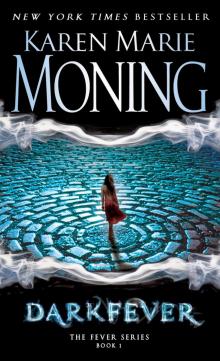 Darkfever
Darkfever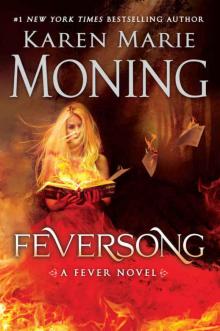 Feversong
Feversong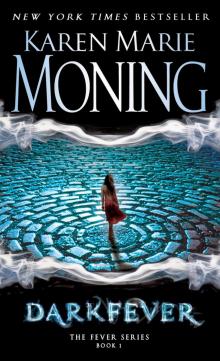 Faefever
Faefever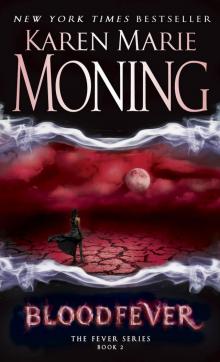 Bloodfever
Bloodfever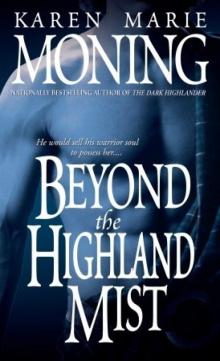 Beyond the Highland Mist
Beyond the Highland Mist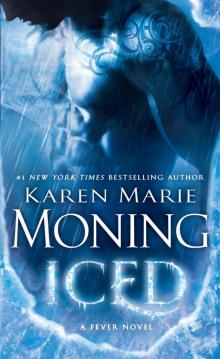 Iced
Iced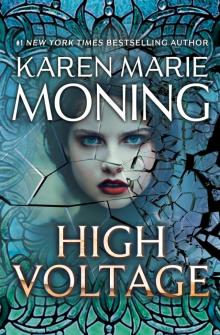 High Voltage
High Voltage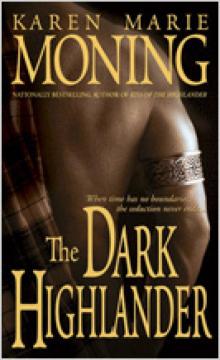 The Dark Highlander
The Dark Highlander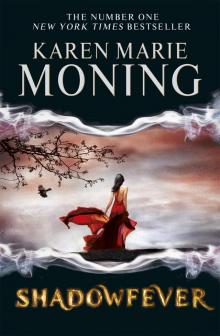 Shadowfever
Shadowfever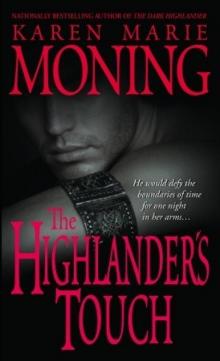 The Highlander's Touch
The Highlander's Touch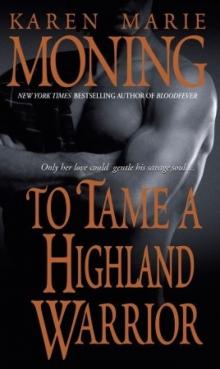 To Tame a Highland Warrior
To Tame a Highland Warrior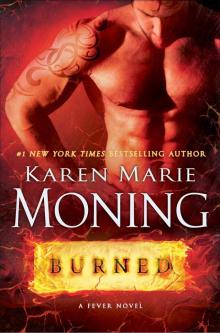 Burned
Burned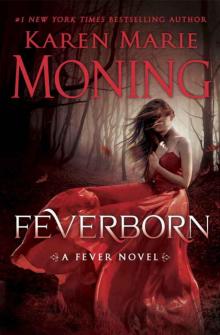 Feverborn
Feverborn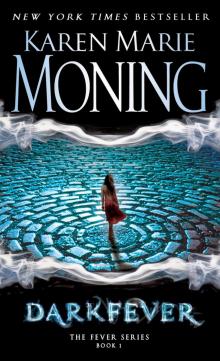 Dreamfever
Dreamfever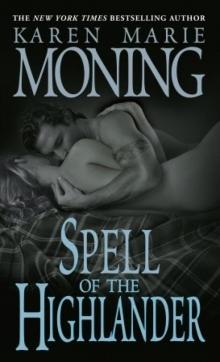 Spell of the Highlander
Spell of the Highlander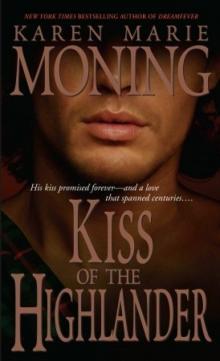 Kiss of the Highlander
Kiss of the Highlander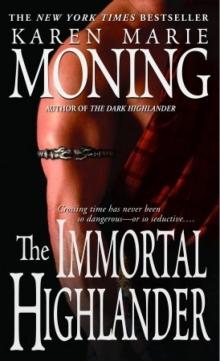 The Immortal Highlander
The Immortal Highlander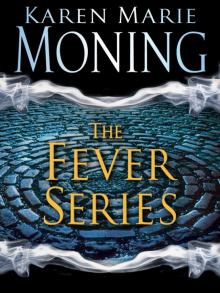 Karen Marie Moning’s Fever Series 5-Book Bundle: Darkfever, Bloodfever, Faefever, Dreamfever, Shadowfever
Karen Marie Moning’s Fever Series 5-Book Bundle: Darkfever, Bloodfever, Faefever, Dreamfever, Shadowfever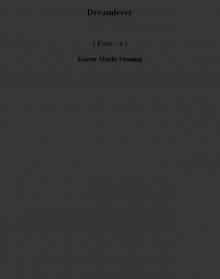 Dreamfever f-4
Dreamfever f-4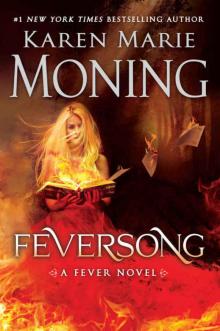 Feversong: A Fever Novel
Feversong: A Fever Novel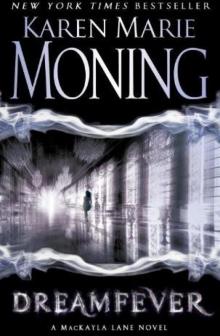 Dreamfever_The Fever Series
Dreamfever_The Fever Series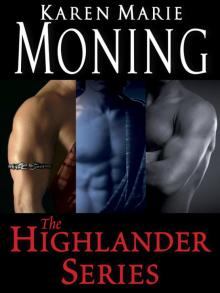 The Highlander Series 7-Book Bundle
The Highlander Series 7-Book Bundle![[Highlander 04] - Kiss of the Highlander Read online](http://i1.bookreadfree.com/i1/03/29/highlander_04_-_kiss_of_the_highlander_preview.jpg) [Highlander 04] - Kiss of the Highlander
[Highlander 04] - Kiss of the Highlander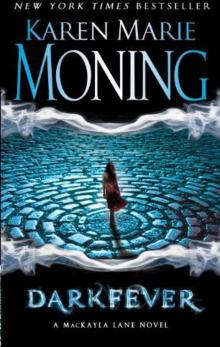 Darkfever_The Fever Series
Darkfever_The Fever Series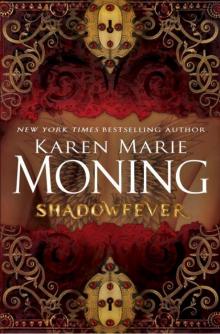 Shadowfever_Fever
Shadowfever_Fever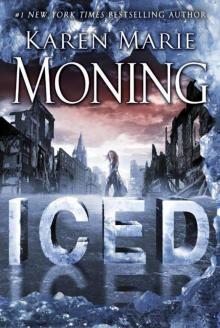 Iced: A Dani O'Malley Novel (Fever Series)
Iced: A Dani O'Malley Novel (Fever Series)![Fever [08] Feverborn Read online](http://i1.bookreadfree.com/i2/04/09/fever_08_feverborn_preview.jpg) Fever [08] Feverborn
Fever [08] Feverborn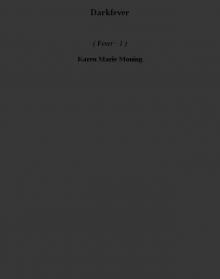 Darkfever f-1
Darkfever f-1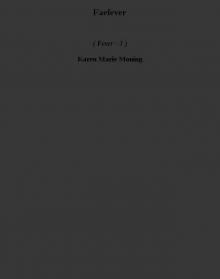 Faefever f-3
Faefever f-3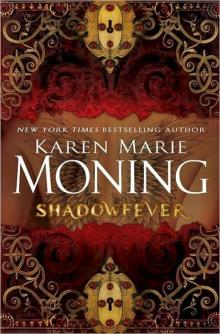 Shadowfever f-5
Shadowfever f-5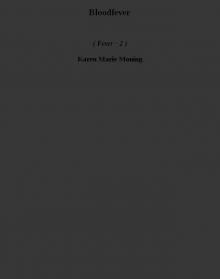 Bloodfever f-2
Bloodfever f-2